Resources
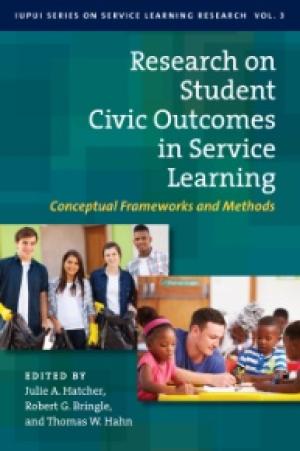
Click Here for Book Review At this time of a renewed call for colleges and universities to create campus cultures that support and develop students’ understanding and commitment to civic participation, what is known about the design of service learning courses and their effectiveness to achieve this goal? This volume presents research on--and deepens understanding of--teaching strategies that foster the knowledge, skills and dispositions of college graduates to be actively engaged in their communities as citizens and civic-minded professionals. The first section offers an overview of civic learning and the importance of intentional service learning course design to reach civic outcomes. The next section employs various disciplinary perspectives to identify theories and conceptual frameworks for conducting research on student civic outcomes. The third section focuses on research methods and designs to improve research using quantitative and qualitative approaches, cross-institutional research strategies, longitudinal designs, authentic data, and local and national data sets. Chapters also address implications for practice and future research agendas for scholars. (From the Publisher)
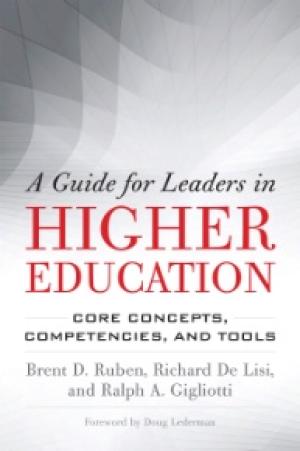
Click Here for Book Review At a time when higher education faces the unprecedented challenges of declining revenues and increased scrutiny, questions about access, cost, and the value of degrees, and the imperative to educate a more diverse student body, there is an urgent need for leadership that is conversant with, and able to deploy, the competencies, management tools, and strategic skills that go beyond the technical or disciplinary preparation and “on the job” training that most leaders have received. This book is intended as a practical resource for academic and administrative leaders in higher education who seek guidance in dealing with today’s complexity, opportunities, and demands. It is also addressed to those who aspire to hold positions of leadership, and to the many faculty and staff members who serve in informal leadership roles within their departments, disciplines, or institutions. Additionally, the book serves as a guide and resource for those responsible for the design and implementation of leadership development programs in higher education. While recognizing the differences in mission and circumstance across institutional types, the authors begin by offering a foundational understanding of higher education as a sector, the political, social, and economic climate in which it operates, and the potential opportunities ahead. Subsequent sections of the book cover leadership concepts and competencies, along with a series of applied tools for leadership and organizational effectiveness. Each chapter concludes with related case studies and guiding questions for further reflection. The final section highlights models for developing institutional leadership programs that progressively meet the needs of leaders along their careers. The content and format of this book reflect the authors’ views that leadership development is most effective when it is an intentional, reflective, and systematic experience. While they espouse the practice of general principles of leadership, they also take into account the unique context of higher education with its numerous internal and external stakeholders, multiple missions, particular organizational governance, and a culture that fosters individual autonomy and creativity. (From the Publisher)
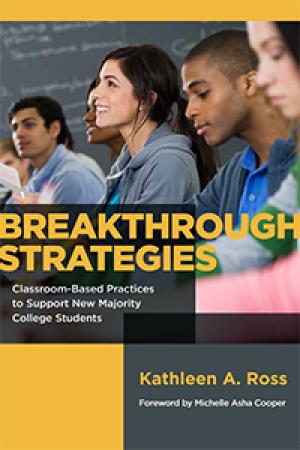
Click Here for Book Review Breakthrough Strategies identifies effective strategies that faculty have used to help New Majority students—those from minority, immigrant, or disadvantaged backgrounds—build the necessary skills to succeed in college. As the proportion of New Majority students rises, there is increased attention to helping them gain access to college. Once enrolled, however, these students often face significant challenges of adjustment, with few resources for support. Specifically, there is little attention to students’ experiences within their college classrooms and their relationships with professors. At the same time, faculty who work with these students have little guidance on how to help them adjust to new expectations and identities as they engage with college-level work. Sister Kathleen A. Ross, a MacArthur fellow and president emerita of Heritage University, has devoted three decades to helping New Majority students get college degrees. Based on an action-research project undertaken at Heritage University and Yakima Valley Community College in Washington State, the book highlights eleven strategies to encourage student success, including: asking questions in class; navigating the syllabus; and developing an academic identity. Written in a warm, down-to-earth voice, Breakthrough Strategies is infused with the belief that faculty can become a powerful resource for students, and that classroom instruction can be an important vehicle for supporting these students’ development and success. (From the Publisher)
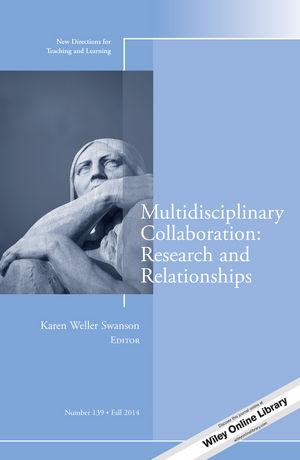
This volume focuses on SoTL, the scholarship of teaching and learning. It discusses how collaborations among and between disciplines can strengthen education and the ways in which students are taught. The community of scholars at an institution can provide a fertile ground for interdisciplinary collaboration that can enliven the educational process and the research that supports it. The authors here come from many different disciplines where they teach and use SoTL to inform their own practice and share what they have done with others. This is the 139th volume of the quarterly Jossey-Bass higher education series New Directions for Teaching and Learning. It offers a comprehensive range of ideas and techniques for improving college teaching based on the experience of seasoned instructors and the latest findings of educational and psychological researchers. (From the Publisher)
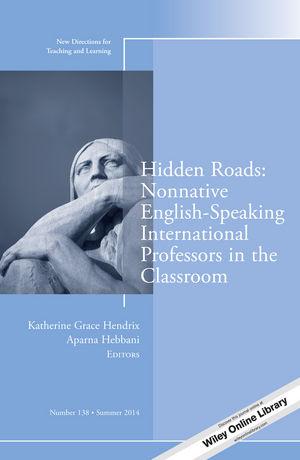
This issue uses the powerful narrative of autoethnography to make visible the existence of international professors and teaching assistants who speak English as a Second Language. These important, but often invisible, individuals contribute daily to the education of students within the US postsecondary educational system. This volume covers a variety of experiences, such as: - Faculty of color teaching intercultural communication - International teaching assistants’ attitudes toward their US students - The challenges to existing cultural assumptions in the US classroom. These experiences - in the form of challenges and contributions - are foregrounded and highlighted in their own right. This is the 138th volume of the quarterly Jossey-Bass higher education series New Directions for Teaching and Learning. It offers a comprehensive range of ideas and techniques for improving college teaching based on the experience of seasoned instructors and the latest findings of educational and psychological researchers. (From the Publisher)
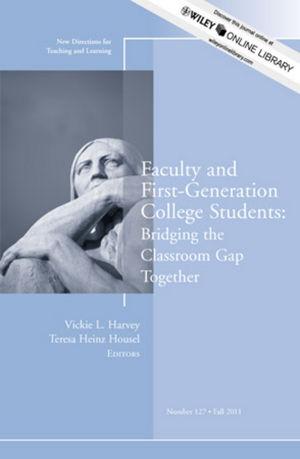
Gain a greater understanding of the academic, cultural, and social experiences of first-generation college students (FGS). Fascinating, heart-touching, and important, the research and the stories presented here enlighten what FGS often have to overcome to successfully complete their degrees. With an emphasis on improving FGS' college success, retention, and graduation rates, this volume first covers common obstacles and the trend of FGS continuing on for graduate degrees. Section Two discusses the complex interplay of social, academic, emotional, and financial influences on academic performance. The chapters collectively affirm that the commitment of university resources is critical to college success. This is the 127th volume of the Jossey-Bass higher education quarterly report New Directions for Teaching and Learning, which offers a comprehensive range of ideas and techniques for improving college teaching based on the experience of seasoned instructors and the latest findings of educational and psychological researchers. (From the Publisher)
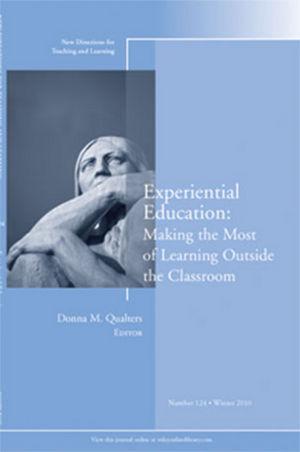
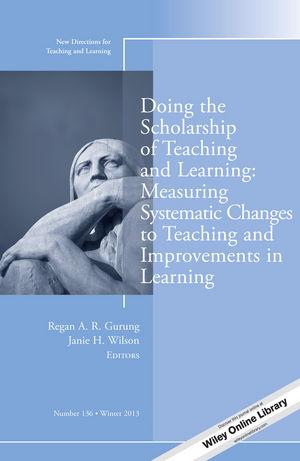
The Scholarship of Teaching and Learning (SoTL) should be an integral part of every academic’s life, representing not only the pinnacle of effortful teaching, but also standing side by side with more conventional disciplinary scholarship. Although practiced by many instructors for years, SoTL has garnered national attention resulting in a spate of new journals to publish pedagogical research. SoTL helps students, fosters faculty development, and has been integrated into higher education. This volume provides readers with challenges that will motivate them to engage in SoTL and take their pedagogical research further. We include many key features aimed to help both the teacher new to research and SoTL and also researchers who may have a long list of scholarly publications in non-pedagogical areas and who have not conducted research. This is the 136th volume of this Jossey-Bass higher education series. It offers a comprehensive range of ideas and techniques for improving college teaching based on the experience of seasoned instructors and the latest findings of educational and psychological researchers. (From the Publisher)
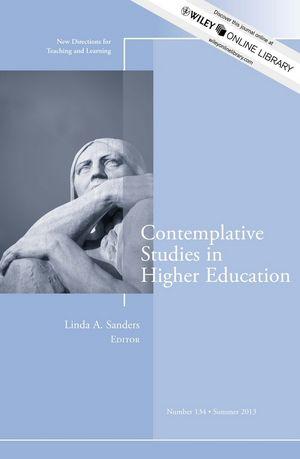
The complexities of 21st-century life- personal, social, cultural, and environmental - demand thoughtful responses, responses fostered and enhanced through contemplative experience. Contemplative education includes studies of the history, psychology, and socialcultural context of such experience, as well as the development of experiential knowledge through one or more personal practices. Contemplative education has recently emerged in the academy. Although there has been significant published discussion of postsecondary courses and programs that incorporate contemplative views and practices, there have been few studies of relevant curricula and pedagogy. This volume integrates research, theory, and practice through a fusion of perspectives and approaches, giving readers the opportunity to review contemplative educational concepts and applications in academic, social, and institutional domains. This is the 134th volume of this Jossey-Bass higher education series. New Directions for Teaching and Learning offers a comprehensive range of ideas and techniques for improving college teaching based on the experience of seasoned instructors and the latest findings of educational and psychological researchers. (From the Publisher)
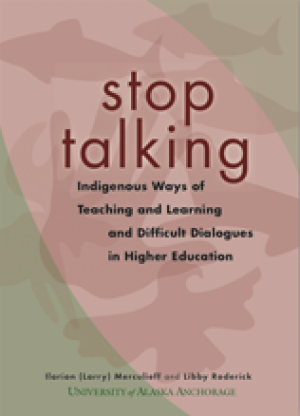
Click Here for Book Review For 10,000 years, Alaska’s Native peoples have survived and thrived in some of the harshest conditions in the world. During that time, they perfected teaching and learning practices that ensured the survival of their communities and the wellbeing of their natural environments. Those ancient practices offer fresh insights for educators who care about the state of our world and seek ways to make education more relevant and engaging. This book describes a unique higher education project that broke some difficult silences between academic and Native communities by introducing a small group of non-Native faculty members to traditional Alaska Native ways of teaching and learning. It presents a model for a Native-designed and run faculty development intensive, strategies for applying indigenous pedagogies in western learning environments, reflection on education by Alaska Native Elders, and reports from participants on what they learned and what they tried in their classrooms. It is intended to stimulate discussion and reflection about best practices in higher education. (From the Publisher)